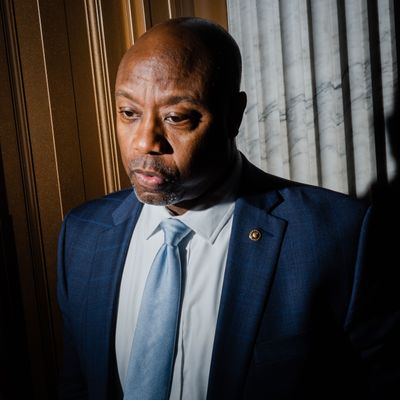
Eternal as it may have seemed, the “invisible primary” phase of the 2024 Republican presidential-nominating contest is slowly giving way to the real thing. The Iowa Caucuses are approaching on January 15, with contests in New Hampshire, Nevada, and South Carolina quickly following. A number of developments that candidates probably expected simply haven’t happened, most notably a loss of altitude by front-runner Donald Trump and a rapid winnowing of a relatively large field of rivals.
But political illusions don’t last forever, and the odds are increasing that others will soon join early presidential-campaign-trail dropouts Francis Suarez and Will Hurd. The most obvious prospect for an early exit is former Arkansas governor Asa Hutchinson, who didn’t make the cut for the second Republican debate. Hutchinson has said he’ll quit the race if he doesn’t poll at 4 percent or more in one of the early states by Thanksgiving. Another candidate likely to pack it in is North Dakota governor Doug Burgum, who did make the stage in Simi Valley but didn’t do himself much good with a performance mostly consisting of shouting while other candidates tried to answer questions. His lavish personal spending hasn’t really given him much of a purchase on voters anywhere. He would seem to have little chance of qualifying for the third debate (which requires 4 percent showings in two national or one national and two early-state polls).
Now nobody really gave Suarez, Hurd, Hutchinson, or Burgum much of a chance in the 2024 contest, so their absence will mostly just make subsequent debates, assuming there are any, a little less crowded and unruly. But there’s one candidate whose campaign may be circling the drain right now who was considered a serious aspirant (to the extent any challenger to Donald Trump has been serious): South Carolina senator Tim Scott.
Scott entered the race with some robust encouragement from fellow senators, a strong track record on issues conservative Evangelical voters care about, and a reputation for being “sunny” and “optimistic” that in some circles gave him an advantage over doomsayers and liberal-haters like Trump and Ron DeSantis.
During the summer Scott had a bit of an early-state polling boom, particularly in Iowa, where he seemed to be outperforming Mike Pence as the favorite candidate of hard-core conservative Evangelics. He had lots of money (though much of it was leftover Senate campaign dollars) and very good favorability ratios.
But then … well, things have not gone that well for Scott. In his monomaniacal focus on Iowa and his constant efforts to outflank Trump on the right, DeSantis preempted some of the ground Scott (and for that matter Pence) hoped to occupy as “true conservative” candidates willing to champion abortion bans. Then the debates arrived, and in the first round in Milwaukee Scott was all but invisible. Worse yet, the candidate with whom he shared an early-state geographical base, Nikki Haley, was quite visible and began to gain ground among voters and opinion leaders alike. Scott tried to mix it up with Haley in the second debate, with at best limited success. And he’s now unmistakably sinking in the polls. In the RealClearPolitics polling averages, Scott is in fourth place in Iowa and in his home state of South Carolina, and he is in fifth place in New Hampshire. He trails Haley in all three. Worse yet, in national polls, Scott is in seventh place in the RCP averages and hasn’t gotten more than 2 percent in the eight polls released in October.
Scott’s national polling problems could even keep him out of the third candidate debate; he needs 4 percent in at least one national poll to qualify, and he hasn’t done that well since a Monmouth survey in September. His potential weapon for survival has been a planned autumn ad blitz paid for by his super-PAC. But now Politico reports the blitz has been called off:
The super PAC supporting Tim Scott’s presidential bid is canceling most of its remaining TV spending, reversing course after reserving $40 million in ads for him ahead of the Iowa caucuses.
The retreat from TV is the latest sign of how dire the primary has become for a candidate who once anticipated outside help from big donors — but who is now polling in low single digits and hasn’t yet qualified for the third debate.
The super-PAC’s explanation for this action is … interesting:
“We are doing what would be obvious in the business world but will mystify politicos — we aren’t going to waste our money when the electorate isn’t focused or ready for a Trump alternative,” wrote Rob Collins, co-chair of the super PAC, who said the “Never-Trump field” is going to be “wasting money this fall” trying to undermine Trump’s current lead.
When do you supposed the electorate will be “focused or ready for a Trump alternative”? In June? July?
You have to wonder if the end is near. Last week Never Trump conservative columnist George Will urged Scott to drop out and endorse his frenemy Haley (who did, after all, appoint Scott to his Senate seat). What made the column especially poignant was this note at the beginning:
Disclosure: The columnist’s wife, Mari Will, an adviser to Republican presidential candidate Sen. Tim Scott (S.C.), disagrees with this column.
Scott has recently shown signs of abandoning his famously upbeat persona while criticizing his Republican rivals (and President Biden) for being insufficiently supportive of Israel in its war with Hamas. It’s not a good look for him. If he no longer has a realistic path to the nomination, it would be smart of him to get out before he makes real enemies or is forced to out-MAGA Trump and the rest of the field.
More on politics
- Trump Ambassador Picks: Who’s in His ‘Diplomatic Clown Car’
- What We Learned From the House Ethics Report on Matt Gaetz
- Everyone Biden Has Granted Presidential Pardons and Commutations






























